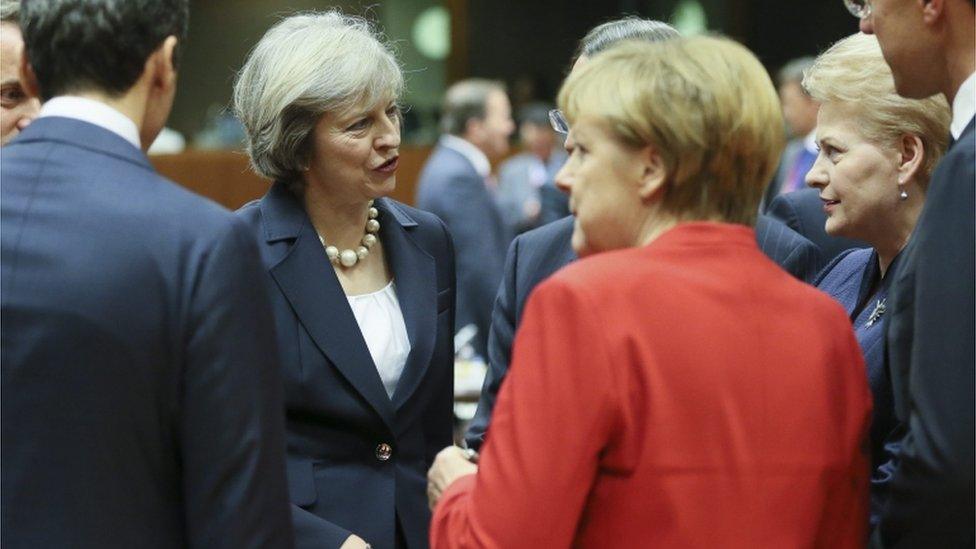Why UK Brexit talk baffles Germany
- Published

Are the PM and German chancellor speaking at cross-purposes?
Theresa May had her first EU summit in Brussels last week. But her after-dinner address to other leaders was greeted with a frosty silence and even Germany appears to be losing patience with London. Could a different understanding of some very simple words be part of the problem?
There's one thing about the German language that if you're British, you never really quite get used to.
It's how to say yes. And how to say no.
An English friend of mine, Jessica, once told me a story which sums up the problem.
When she was at school in London she was about to go on an exchange to stay with a family in Germany, and the teacher sat them all down for a talk.
"Now girls," the teacher explained, "when someone offers you something to eat, and you want it, you say yes, not no."
Germans baffled
These well-brought-up young ladies would usually say: "No, I couldn't possibly" to that plate of biscuits the first time round, and wait to be persuaded before giving in with a gentle: "Oh, go on then."
"In Germany," the teacher went on patiently: "No actually means no. You won't get offered again."
Crazy, Jessica remembers thinking. Obviously the school had had experience of pupils coming back famished.

"I couldn't possibly" can mean "yes please" in British English
In British English, of course, no means yes, yes means no … and "maybe," "possibly" and "would love to but" can mean either.
A group of British people trying to decide where to go to for dinner will say things like "I'm easy" or "I don't mind" - even though everyone blatantly does mind.
This is all quite straightforward to Brits, and the subtext is clear. In Germany it's baffling.
And I suspect it's a cultural difference which partly accounts for the communication problems we're seeing right now over Brexit.
Last year David Cameron tried to persuade German Chancellor Angela Merkel to let the UK have a special deal to opt out of free movement of people, while staying in the single market.
Westminster chatter
She said no. And she meant, well, no. Not "no-but-ok-if-you-push-hard-enough-maybe-yes". Just no.
When she said it again before the referendum vote, she meant no. And last week to Theresa May in Brussels, again, the answer no. She doesn't quite know how to make it any clearer.
But in the UK politicians and journalists are still asking the question: what does Merkel really think?
The chatter in Westminster is all about how Britain can persuade Germany to give up the best bits of the single market.

German political debate values compromise over posturing
And amid all the talk of red lines and not revealing your hand, there is ongoing speculation about how to interpret the signals coming out of Berlin.
In fact, it's all quite simple. Merkel means what she says. And German politicians are getting increasingly frustrated by London not seeming to understand this.
For many in Berlin, you're either in the single market, with all the obligations and privileges that come with that, or you're not. And people here don't understand why Britain doesn't just say which of those two options it wants.
But, to a certain extent, the confusion is quite understandable. Germany and Britain have not only different ways of communicating, but also completely different political cultures.
Rhetorical bluster
In the rough-and-tumble world of confrontational British politics, we're all used to hearing things which sound like one thing, but mean another.
Politics needs to be exciting in the UK to keep voters and journalists interested. So rhetorical bluster and the odd showy, overblown promise, with a bit of backtracking later, is often forgiven, especially if you've managed a witty gag or two along the way.

Find out more
From Our Own Correspondent has insight and analysis from BBC journalists, correspondents and writers from around the world
Listen on iPlayer, get the podcast or listen on the BBC World Service or on Radio 4 on Thursdays at 11:00 BST and Saturdays at 11:30 BST

In Germany - where the tradition of consensual, coalition-building means co-operation and compromise are more highly valued than macho posturing - not saying what you mean is not forgiven. It's seen as dishonest, confused and ineffective.
The German political debate would send most British voters to sleep. Whereas to German sensibilities the British debate looks bafflingly inconsistent.
In fact, that's the word that explains the whole point: you hear the German word "konsequent", which roughly translates as consistent, a lot here.
And it's a highly prized virtue. It means you'll do what you say, and live by the consequences if you don't. Some might say we haven't seen much evidence of that in British politics recently.
Now that's all fine when those differing values and political styles remain in their respective countries. But right now, we have two very different worlds clashing in Brussels.
Brexit may mean Brexit in Westminster. But Theresa May would be well advised to remember that in Germany no very definitely means no.
And if she does get offered a biscuit from Angela Merkel in any upcoming negotiations, she might do well to take it. The plate probably will not come round again.
- Published20 October 2016
- Published4 September 2016
- Published27 June 2016
